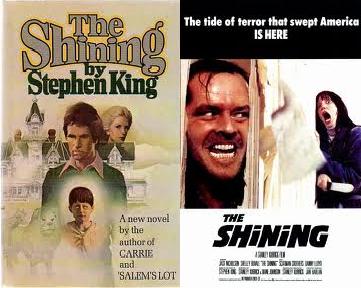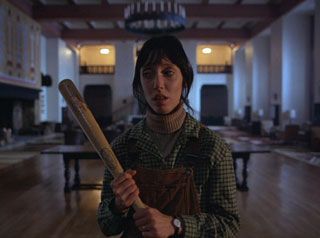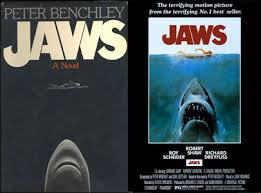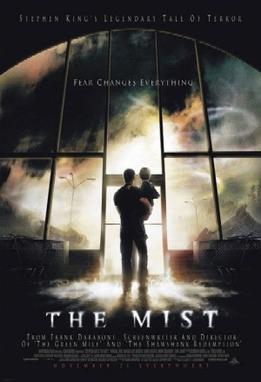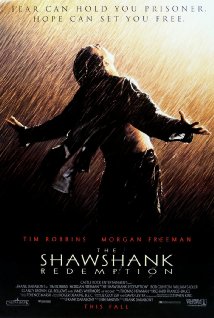More often than not, what you find is the the film finds a different emphasis than the books and as a result, this can tidy up structural flaws or subject matter that cause the book to have a slight lack in its luster. Sometimes, it can tell the same story in a different way and find a better story than the one the author came up with.
Stephen King has been the Shakespeare of 20th century horror fiction. By that, I mean he wrote very adept populist stories that 1) rarely repeated themselves, 2) dealt with traditional environs and subjects, and 3) were able to incorporate modern-day domestic dramas and horrors into the larger scale archetypal ones in wondrous parallel synthesis. That's the reason that he became so popular: each books was both familiar and different, epic and domestic, dipping into different American genres with the same horror tinge (
The Shining in a Rocky Mountain winterscape;
The Gunslinger does post-apocalyptic Western;
Carrie is a supernatural revenge movie in high school;
Salem's Lot does vampires in a small town;
Cujo is a monster movie with an everyday animal;
Pet Sematary takes a childhood fear and renders into an adult menace;
The Stand is basically the American
Lord of the Rings). And he did it with a lurid paperback prose style that was far more sophisticated than many of his imitators possessed. The late 1970s and early-to-mid 1980s is what built his reputation that he now continues to squander. Unusually, this decline in his quality (particularly his endings), also coincided with his sobriety.
For King, I'll bring up 2 case studies where the film changes the book fundamentally:
The Shining and
Needful Things.
The novel is a traditional haunted house story complete with ghosts bent on malicious intent against the living. As a book, it works by building tension about what will ultimately happen, which is the point. The family's presence in the Overlook hotel is where the danger lies and we don't know who will survive as the father descends into madness thanks to the ghosts manipulating his major weakness. But when this story is faithfully rendered into cinematic form (
http://www.imdb.com/title/tt0118460/?ref_=nv_sr_2), the limitations of the novel start to become apparent: it's an extremely extremely conventional story about possession turning a family member into a fiend with a murderous threat in a contained area. It's for all intents and purposes, a Scooby Doo episode with one of the gang as the monster.
The movie throws out the Gothic horror structure to make it a more existential film about going insane in isolation, and what that looks like. The film version turns the ghosts into figments of imagination that--aside from one example--are fairly bland in appearance, which makes them all the more unsettling. The hotel is large and spacious and modern, not at all claustrophobic, but this in turn makes the hotel seem like a looming presence that is omnipresent and invisible, and some its structure creates the feeling that the hotel is a voyeuristic entity devoid of personification:
The hotel's interstitial lighting and recessed hallways create the effect of "eyes" without a face.
Kubrick translates the horror from forensically gory scenes of disgust and renders them into iconic, surrealistic perversions of mundane objects and settings (the elevators, the Grady twins) that perfectly indicate the underlying horror of an average place tainted by the presence of true evil. This has a far greater effect via suggestion than the text can render with detail. Added to which, you have the film's music: avant-garde sonic soundscapes by Eastern Block composers like Penderecki and Ligeti as well as synthesized anharmonic pulsing tracks by Wendy Carlos and Rachel Elkind that serve to render the emotional terror of being in the characters' shoes. And finally, Jack Nicholson's unhinged performance hints at the madness lying underneath a normal man's everyday facade, much like the hotel; the horror doesn't come from what the supernatural has imbued him with...it's what the supernatural has drawn OUT of him.
Kubrick's film demonstrated that a horror film was stronger when the story conveyed the subjective experience of being in a horror movie rather than playing on a voyeuristic tendency to anticipate danger. That's why the film was stronger than book, and why the book still works, but only as a companion piece.
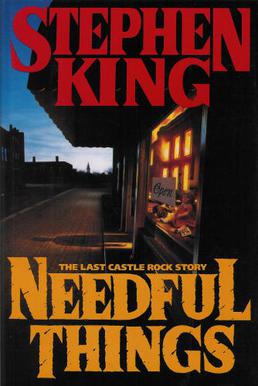

By the time Needful Things had come out, King had started his slip into repetitiveness and outright derivativeness. His books started clocking in at almost 700 pages a piece and they started having diminishing rewards, especially in the endings. With Needful Things, the story was clearly connected to a number of other King novels and thus, the main character of Leland Gaunt was another malicious entity capable of assuming human guise to parasitize human life-force. He apparently has much more power than he show in the film, and he uses those powers to create needlessly deus ex machina solutions (such as a magic car) to help his plans; in the end, he's just another super-powered demonic force.
The film is clearly stand-alone, having little to no connections to the King universe, and as such, Leland Gaunt is clearly supposed to be the Devil. But unlike the book where Gaunt is an almost caricatured rendition of a snake-oil salesman pouring on the charm, the film version--played by Max Von Sydow--is a devilishly amicable character who almost seems to know that he's playing a part and his jovial, grandfatherly ways are almost like a pantomime that he keeps hoping someone will figure out. The theatrical movie is a disappointment because it runs just under 2 hours. However, a much longer (163-minute) TV version exists and can be tracked down with some effort (
https://www.youtube.com/watch?v=DXbCGf97BAk) (TNT used to play it all the time, but in recent years, this has fallen by the wayside). This extended edition makes substantially more sense and manages to ratchet up the stress on the poor but determined Sheriff Pangborn's need to get to the bottom Gaunt's enterprise.
There's no question that completed film is better than the book, especially at the ending. The novel's ending is drawn out and ends in less than 2 pages, with Gaunt's turn to total evil and vanquishing almost tacked on. In the film, Gaunt is defeated and absolutely overjoyed at it; for him, everything has been a delightful game of wits and he is actually amused at being outwitted by a clever human, completely driving home the point that, while clearly not human, he is nevertheless, a salesman.
Probably the gold standard of "Film is Better Than the Book" is Jaws. When Peter Benchley wrote
Jaws, he was writing a potboiler; an airport beach read that was designed to have everything you would want in a book: suspense, sex, and a monster. And when the book came out, not only did
Jaws the movie not exist, but that entire genre of movie didn't exist. That genre of film--which we now call "Tentpoles" or "Summer Blockbusters"--were the province of B-and Z-budget exploitation films ruled by indie producers and international tax shelter investment companies who treated their films as schlock and were consumed by the public as such. In 1973, suggesting that a genre film could be not only art, but made with A-List quality was ludicrous--
The Exorcist was seen as a fluke.
As such, the book is a novel about a small-town sheriff who must find out how to deal with a killer shark eating Amity Island out of house and home with each tourist he chomps. The island's mayor is clearly in bed with the mob and he needs the summer tourist business to provide lucrative kickbacks to his overseers in New York and Sheriff Brody's interest in public safety is hurting the bottom line; at one point in the book, Brody comes home to find out that a mobster has visited his home and killed his cat in front of his son to send a message about keeping the beaches open. In addition, Hooper, the icthyologist sent out to be the science guy for the story, ends up having a love affair with Brody's wife. All this very lurid, pulpy shit takes up half the book before the story we're all familiar with even starts, and it ends pretty much the same way as
Moby Dick.
The film throws out everything but the shark and turns it into an action-adventure movie about killing a smart and powerful force of nature. As such, it is a textbook example of the powers of ensemble casting and finding drama in simple conflict of interest. The characters and the editing of their situation is all you need and the results speak for themselves. The book was a good yarn; the film was an absolute phenomenon that--much like
The Shining--put the fear of God into virtually everyone who watched it because the film took the story and turned it into a visceral, not a cerebral, experience.
Final Examples: The Mist and The Shawshank Redemption
One interesting example is Frank Darabont's 2007 adaptation of King's then-lesser-known 1980 novella
The Mist. Much like
Cujo,
The Mist is a siege/bottle story about everyday people trapped in an exotic situation; this case a strange, near-zero-visibility mist that envelops the town and shuts down all technology. Things get worse when the inhabitants of the town--trapped in a supermarket--find out that the mist is full of creatures with a taste for human flesh. As the days go by, the external threats start to take its toll on the civility of the internal human situation. The story and the film are so close to each other in adaptation that they're virtually interchangeable. There are a few trivial differences, namely the knowledge about The Mist and it's origins--the novella is content with the characters speculations, while the film definitely explains it--but the true divergence is with the ending.
The novella clearly embraces the open-ended climax: anything could happen and the characters have to hope for the next day. The film, does the exact opposite: ending the film as definitively as possible. In fact,
The Mist contains perhaps the most soul-obliterating ending to a movie since
The Vanishing; people have been known to come out of that movie with minor PTSD; reaction videos to it are nowhere near as entertaining as they are for
Star Wars trailers (
https://youtu.be/_gLVVEIGoGA). The most subversive aspect of this is that in any other circumstance, the film version's ending is a happy one, an observation completely lost on the people who make it through the end credits.
By contrast,
The Shawshank Redemption--an adaptation of the novella "Rita Hayworth and the Shawshank Redemption" within King's collection
Different Seasons--is the exact opposite: a depressing prison movie that becomes one of the most life-affirming film experiences in the history of cinema. The novel and the film take the same approach: a young banker is sentenced to life in prison for the alleged murder of his wife and her lover. He eventually uses his professional acumen to buy a favorable life inside and eventually becomes a money launderer for one of the prison wardens. But the book retains an ambiguous tone: the banker--Andy Dufresne--is a mysterious character and remains one throughout the story; it's left to the audience to wonder if he's actually guilty or innocent, and when evidence comes to light that might exonerate him, the situation is resolved in a fairly undramatic (but more realistic) fashion. Added to which, there are several wardens in the prison over the years as opposed to one. And the ending takes King's favored open-ended approach that he did with The Mist: who knows?
The film does away with all of that and embraces traditional Golden Age Hollywood in all of its glory. Andy is clearly innocent, there is one warden who goes from virtuous to villainous by the film's end and the inciting incident that gets the ball rolling is dramatic as hell. And, the movie does away with the open-ended ending for something truly conclusive and powerful. There is a reason this movie keeps vying with
The Godfather as the #1 Greatest Movie of All time on the IMDb: it eschews the impact-deadening and unnecessary ambiguity of the book and makes clear, definitive decisions and the story is all the better for it.
Beyond this, there are far too many to go into. Movies have been adapting books from as far back as
Frankenstein in 1910, and half the catalog of the medium is based on pre-existing material. I can't remember them all, and most of them I haven't read the source material either because its out of print or because I never knew it was a book at all. But this should answer most of the questions you asked.




